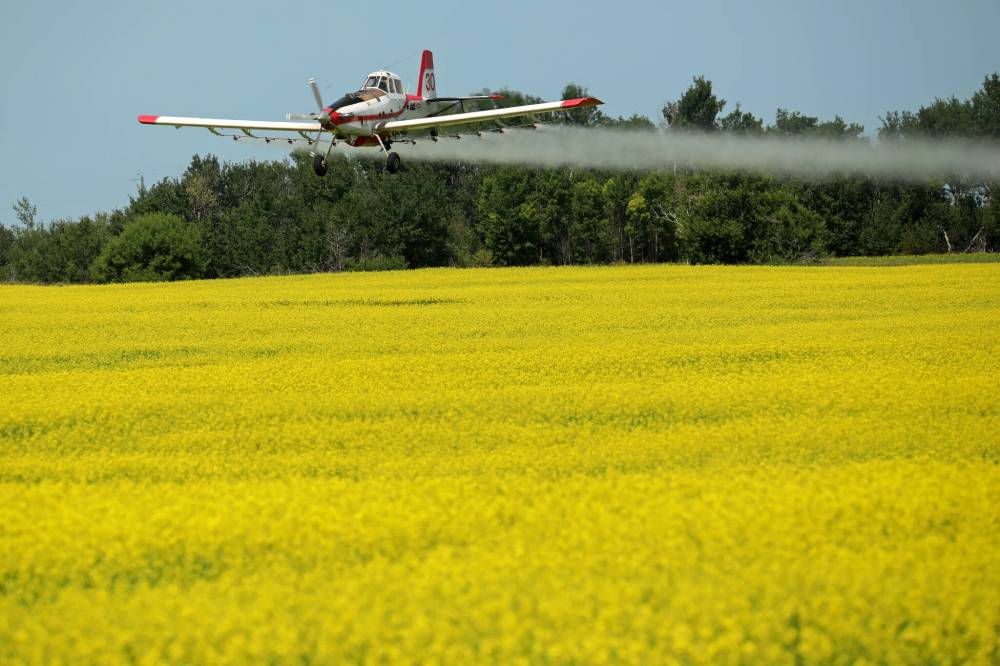China tariffs hit canola, pork sectors
Advertisement
Read this article for free:
or
Already have an account? Log in here »
We need your support!
Local journalism needs your support!
As we navigate through unprecedented times, our journalists are working harder than ever to bring you the latest local updates to keep you safe and informed.
Now, more than ever, we need your support.
Starting at $15.99 plus taxes every four weeks you can access your Brandon Sun online and full access to all content as it appears on our website.
Subscribe Nowor call circulation directly at (204) 727-0527.
Your pledge helps to ensure we provide the news that matters most to your community!
To continue reading, please subscribe:
Add Brandon Sun access to your Free Press subscription for only an additional
$1 for the first 4 weeks*
*Your next subscription payment will increase by $1.00 and you will be charged $20.00 plus GST for four weeks. After four weeks, your payment will increase to $24.00 plus GST every four weeks.
Read unlimited articles for free today:
or
Already have an account? Log in here »
Hey there, time traveller!
This article was published 11/03/2025 (241 days ago), so information in it may no longer be current.
China’s decision to impose tariffs on Canadian pork and canola is set to have significant repercussions for the Prairies, which rely on exports.
Over the weekend, China announced retaliatory tariffs on more than $2.6 billion worth of Canadian agricultural and food products, including a 100 per cent tariff on its imports of Canadian canola and peas and 25 per cent on pork. The move is a response to levies Ottawa introduced last October.
The Chinese commerce ministry said the tariffs, which take effect March 20, match the 100 per cent and 25 per cent import duties Canada slapped on China-made electric vehicles and steel and aluminium products last year. The trade war is turning global, as Canada also faces crippling tariffs from the United States on April 2.

Black Creek Farm owner Simon Ellis says canola growers are already feeling the impact from the new tariff. (Submitted)
The canola tariff is a big concern for Westman farms because it’s making the crop less profitable, even though it’s already one of the most expensive to grow, Wawanesa-based Black Creek Farm owner Simon Ellis told the Sun.
“We are already feeling the pressure,” Ellis said in an interview on Monday. “Companies have started lowering their canola prices, and some have even stopped buying it altogether. We’re worried about breaking even.”
For farmers like Ellis, the long-term uncertainty makes financial planning difficult.
“Canola was a foundational industry that needed to remain strong, and uncertainty, coupled with trade issues with the U.S., was making it difficult for farmers to plan with confidence,” he added
The impact could extend beyond farms, potentially leading to job losses in processing and related industries.
“Our farm is in a relatively stable position because we run a lean operation — it’s just my wife, my dad and me handling the farm side,” Ellis said. “But if this continues, the wider industry could see job cuts, particularly in the canola crush sector and related industries.”
He said he understood the government’s position on protecting jobs in Canada through tariffs on Chinese electric vehicles and steel, but emphasized the need for a solution. He suggested officials reconsider some of these tariffs to ease tensions with China and work toward a deal.
Ellis saw an opportunity in increasing domestic consumption, particularly in the food and feed industries. He noted if consumers chose Canadian canola for frying oils, salad dressings and other uses, it would be beneficial. Expanding its use in feed industries, he added, could also help. However, he pointed out that Canada produced a significant amount of canola and had become highly skilled at growing it over the years. While domestic demand could play a role, he expressed doubt that it alone would be sufficient to absorb the entire supply, underscoring the continued need for export markets.
China is the second-largest export market for Canadian canola, with trade between the two countries valued at $4.9 billion in 2024, Canada Canola Growers Association president Rick White told the Sun on Monday.
He explained China imported approximately 5.9 million tonnes of canola seed that year, making it a key buyer for the industry.
“The tariffs on oil and meal are already in place, but the real concern is whether China will apply similar tariffs on canola seed,” White said. “If that happens, it will have a huge impact on the farm gate price.”
A study commissioned by the association estimated significant tariffs on canola seed could cause farm prices to drop by $2 to $5 per bushel, resulting in losses of $1.76 billion to $4.33 billion for the 2025-26 crop year.
While alternative export markets exist, White said they are not large enough to offset the losses from China and the U.S., Canada’s top two canola buyers.
“There are limited opportunities to go elsewhere,” he said. “The real opportunity lies in increasing domestic consumption through biofuels.”
White is urging the federal government to accelerate efforts to support biofuel production in Canada, which he said could utilize two to three million tonnes of canola seed annually.

An aerial sprayer flies over a canola field in bloom west of Rivers. This may be tough to hear, but we fired first with tariffs on Chinese EVs, and China is firing back with a tariff on canola. Unfortunately, it's farmers who are caught in the middle. (Tim Smith/The Brandon Sun files)
“This could be a way to make us less reliant on China and the U.S.,” he said. “It’s a market within our borders that we can control, but regulatory delays are holding back investments.”
The tariffs will also impact the pork industry.
The new tariffs could drive down demand, pricing and overall profitability for the province’s hog farmers, Manitoba Pork general manager Cam Dahl told the Sun.
“China ranks as the province’s fifth-largest pork export market, following the United States, Japan, Mexico, and South Korea,” he said in an email. “Over the last three years, Manitoba has exported an average of just over $130 million in pork to China, accounting for approximately 8.5 per cent of its total pork exports.”
Dahl said the province’s hog sector supports 22,000 jobs and contributes $2.3 billion to the province’s GDP each year.
“Tariffs, whether from China or the United States, put that at risk,” he said. “Manitoba produces eight million pigs per year, with 90 per cent of production exported either as live animals to the U.S. or as packaged pork worldwide. Both U.S. and Chinese tariffs will drive down demand, leading to lower prices and profitability challenges for hog farmers.”
Finding alternative markets to offset the potential losses from China will not be an easy task, Dahl noted. Many pork products shipped to China consist of cuts that have little demand in other markets, making it unlikely that these exports can be redirected in the short term.
Manitoba Pork is actively engaging with both federal and provincial governments to explore trade diversification strategies and potential domestic market expansion to cushion the blow.
“We are working with our partners in the U.S., such as Iowa and Minnesota, as well as with the Canadian Pork Council, Canadian Meat Council and other agricultural commodity groups to develop a unified response to the tariffs,” Dahl said.
» aodutola@brandonsun.com
» X: @AbiolaOdutola
